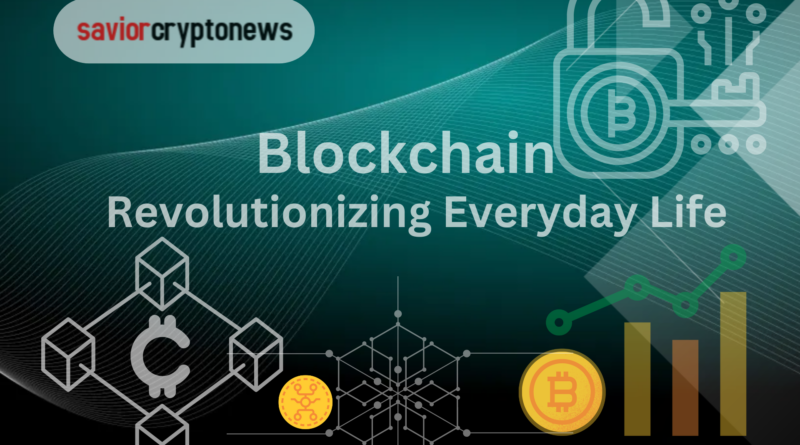Blockchain: Revolutionizing Everyday Life
Blockchain technology has emerged as a transformative force with the potential to reshape various facets of our lives. Originally conceptualized as the underlying technology for cryptocurrencies like Bitcoin, blockchain has since transcended its origins to find applications across diverse industries and sectors. Its decentralized and secure nature offers solutions to age-old challenges, from financial transactions to supply chain management, and beyond. This blog will explore how blockchain applies to our daily lives and its potential future impact.
Understanding Blockchain Technology
Blockchain is a decentralized register that records transactions across several networks of computers. Individually every transaction is saved in a “block” linked to the previous one, forming a chain of links or blocks – therefore it is called the blockchain. This distributed ledger is maintained by a network of nodes (computers), making it highly transparent, secure, and resistant to tampering.
Applications in Finance and Banking
The most important utilization of blockchain is deals in finance and banking. Traditional banking systems often involve intermediaries and lengthy processes for transactions. Blockchain technology enables faster, more efficient, and secure transactions directly between parties, reducing costs and eliminating the need for intermediaries. Cryptocurrencies like Bitcoin and Ethereum operate on blockchain networks, offering decentralized alternatives to traditional currencies and financial systems.
Enhancing Supply Chain Management
Blockchain’s transparency and immutability make it perfect for supply chain management. By recording every transaction or movement of goods on a blockchain, companies can track products from their origin to the end consumer. This improves transparency and helps detect and mitigate issues such as fraud, theft, or counterfeit products. Walmart, for example, has been executed on blockchain to track the journey of produce from farm to store, ensuring food safety and authenticity.
Securing Digital Identities
In an increasingly digital world, securing identities and personal data is paramount. Blockchain technology provides a decentralized solution to identity management, offering individuals control over their personal information. Blockchain-based digital identities can streamline verification processes across various services and platforms while protecting against identity theft and unauthorized access.
Transforming Healthcare
Blockchain holds promise in revolutionizing healthcare by securely storing and sharing patient records across healthcare providers. This interoperability can improve patient care by ensuring accurate and timely access to medical histories, reducing administrative costs, and enhancing data security and privacy.
Smart Contracts and Legal Applications
Smart contracts, self-executing contracts with the terms of the agreement directly written into code, are another innovation made possible by blockchain. These contracts automate and enforce agreements without intermediaries, reducing costs and improving efficiency in sectors such as real estate transactions, insurance claims processing, and intellectual property rights management.
Blockchain in Government and Voting
Governments are exploring blockchain for applications such as transparent voting systems and efficient public service delivery. Blockchain’s tamper-resistant nature ensures the integrity of voting processes, enhancing trust in democratic systems. Moreover, blockchain can streamline administrative processes like property registry and licensing, reducing bureaucracy and corruption.
Challenges and Future Outlook
Despite its potential, blockchain technology faces challenges such as scalability, regulatory concerns, and energy consumption. Scalability issues are being addressed through innovations like sharding and layer-two solutions, aiming to increase transaction throughput without compromising security. Regulatory frameworks are evolving to accommodate blockchain’s disruptive potential while ensuring consumer protection and financial stability.
Looking ahead, the future of blockchain appears promising. As research and development continue, we may witness broader adoption across industries, further enhancing efficiency, transparency, and security in our daily lives. Innovations such as decentralized finance (DeFi), non-fungible tokens (NFTs), and blockchain-based voting systems are already demonstrating the versatility and transformative power of this technology.
Conclusion
Blockchain technology is not just a buzzword but a catalyst for significant change across various sectors. From finance to healthcare, supply chain management to government services, blockchain’s decentralized and secure nature is paving the way for a more efficient, transparent, and inclusive future. While challenges remain, the ongoing development and adoption of blockchain applications promise to reshape our lives in ways previously unimaginable. Embracing blockchain technology today means embracing a future where trust, security, and innovation converge to create lasting impact.
As we continue to explore and implement blockchain solutions, its potential to improve efficiency, transparency, and security in our daily interactions becomes increasingly evident. Whether through streamlined financial transactions, secure digital identities or transparent supply chains, blockchain is set to redefine our expectations of what is possible in the digital age.




